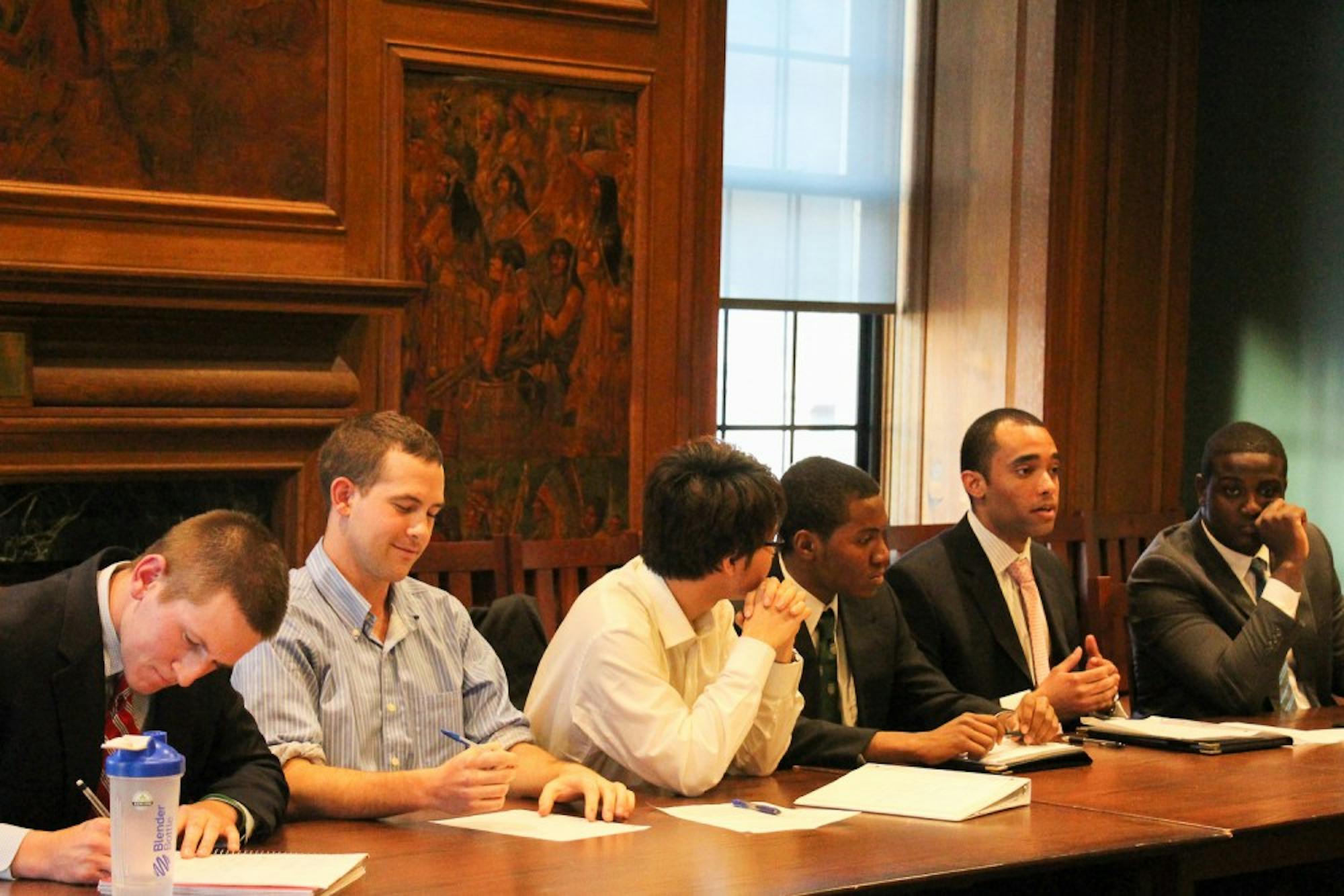Student Assembly must work to address the 14 percent drop in applications this year, presidential and vice presidential candidates agreed in a debate last night. Over the course of the discussion, hosted by the current Student Assembly in Paganucci Lounge, candidates spoke about student unity, finances and public perception of the College.
Presidential candidates Casey Dennis ’15, Jay Graham ’15, Jon Miller ’15 and Yesuto Shaw ’15 and vice presidential candidates Frank Cunningham ’16 and Harry Qi ’17 took part in the debate, the second of four this week. Matt Robinson ’15, a vice presidential candidate and Graham’s running mate, was absent. Aaron McGee ’14, a Student Assembly member, moderated the debate.
Each candidate present at the debate mentioned the new Improve Dartmouth website as a forum for learning about the needs of the student body and highlighting appropriate solutions.
Shaw and Qi, who is running on a ballot with Miller, both said the application drop reflected deeper issues at the College.
Qi said that he met with dean of admissions and financial aid Maria Laskaris last week to discuss the application drop. During the time periods allotted for candidate rebuttals, he repeatedly called on other candidates to propose “concrete” solutions.
Dennis, who is running with Cunningham, said a lack of communication among students has caused discordance. He proposed releasing a regular report of Student Assembly activity to increase the Assembly’s visibility on campus.
Toward the middle of the debate, McGee asked candidates to name a specific item in the “Freedom Budget” that they agreed or disagreed with and urged candidates to explain their answer.
Both Shaw and Cunningham identified the document’s demand for increased retention of minority faculty members as a point they supported. Graham added that holding exit interviews for departing faculty members could help pinpoint why certain faculty left Dartmouth after a short stay at the College.
Miller said that he agreed with calls in the “Freedom Budget” for pro-bono legal assistance for undocumented students. As president, he said, he would aim to increase admissions transparency, especially in regard to students who identify with minority groups, and with recruitment policies as well.
McGee then asked candidates to address how no women are running for president or vice president — a fact he called “the elephant in the room.”
In response, Shaw emphasized that he intends to represent all students, regardless of race, gender or socioeconomic class.
Shaw, running without a vice presidential partner, said his three years of experience in student government at Dartmouth made him uniquely qualified to be president.
When asked to discuss their proposed handling of the Student Assembly budget, all candidates stated the importance of the Assembly’s two main expenditures — the “take your professor to lunch” program and the readership program, which provides free national newspapers in public locations.
Miller said that although he supported the lunch program, he believed the Assembly should scale back expenditures, as the Undergraduate Deans Office runs a similar program.
Candidates also discussed negative media attention recently received by the College. Graham said he felt it was important not to focus on eliminating protests but instead to ensure that students do not feel the need to demonstrate.
Dennis proposed creating a weekly feature on outstanding students to highlight positive values and diversity at Dartmouth.
“We want to show how Dartmouth students are changing the world,” he said.
Graham said Student Assembly should create programs with long-lasting impact, citing an idea to grant physical education credit to students who complete the Dartmouth Bystander Initiative.
Miller is a member of The Dartmouth opinion staff. Cunningham is a member of the Dartmouth business staff.
About 25 students comprised last night’s audience.
Elections Planning and Advisory Committee member and senior class president Chisom Obi-Okoye ’14 said that she felt that the candidates were better prepared for this debate than the last.
Jessica Womack ’14, secretary of the Class of 2014, said that the quality of student questions, which covered topics from Dartmouth’s public image to reasons why students protest, distinguished this debate from Tuesday’s.
The third candidate debate, hosted by the Inter-Community Council, will be held Thursday at 8 p.m.




